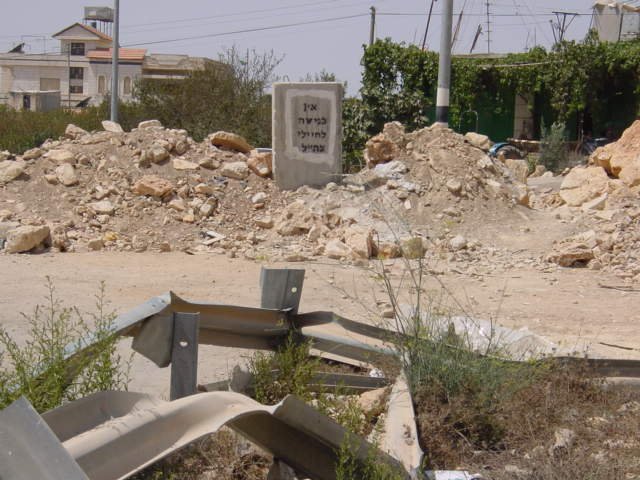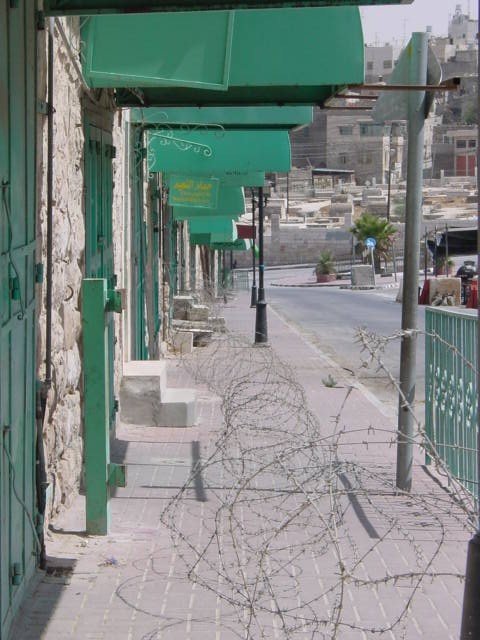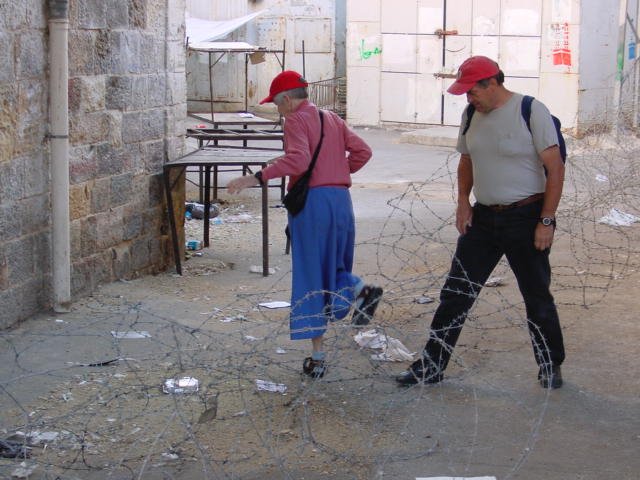September 7, 2001
We grabbed our usual shared taxi towards Ramallah this morning. When we got to an Israeli checkpoint at Hamra (towards the Jordan Valley and Jericho), we queued up behind several other waiting cars. The two of us went to speak with the soldier to see what was happening - he spoke no English, and Marthame's Hebrew isn't exactly passable. After a lot of pointing and approximating language, he told us our taxi could move to the front of the line. When we arrived to him, he took everyone else's IDs and told us we had to turn around - no one without Jerusalem permits could pass. We argued for several minutes until one passenger who spoke Hebrew was able to explain the situation - we're not going to Jerusalem, but this is the only road open to get where we want to go. We passed and our taxi let us out near Ramallah.
After another taxi ride, we arrived in Jerusalem and met up with some friends, including journalists who are joining us in Hebron to do a story on the Christian Peacemaker Teams (CPT). Sitting outside at a west Jerusalem cafe was a touch unnerving after the spate of terrorist bombings, and the feeling of fear in the air was palpable. It was there that we read the CPT press release issued last night that two of their team were attacked and beaten by young settler boys as Israeli soldiers watched on and refused to call police. When the police came, the young boys tried to prevent the police from intervening. We later learned that the police pulled the two women to safety in their car, and said almost apologetically that there was nothing they could do to stop the boys, as they (at least the ones who didn't run away upon their arrival) were under 11 years old. With fear and trembling, did we say?
A bulldozed road and a (misspelled) Hebrew sign that says, “No enter to soldiers”.
We grabbed a taxi and headed down towards Hebron, crossing the now-familiar sight of bulldozed roads and tanks. We met up with one of the CPTers in bustling H1 (under PA control) and headed into the eerie quiet of H2 (under IDF control), now under its 200th day of curfew (for Palestinians, not Israelis or CPTers) since the beginning of the Intifada almost one year ago. We went out with one of the team to see the spot where she was attacked last night. A few young boys (6 or 7 years old) were there, and began to throw a few small stones. This time, the soldiers at least corralled the youngsters.
The red CPT hats are well-known in Hebron.
As we continued around the city, we were invited in by a woman - we thought for a social call, but apparently the CPTers' red hats are famous, as are their actions of intervention. We entered to find a young man with his foot bandaged and oozing. Yesterday, he dropped a pot of hot tea on his foot, but was prevented from going to the hospital by Israeli soldiers (contradicting not only international law, but also their own explicit military orders). After a few phone calls to Doctors without Borders, the CPTers were able to get an ambulance close to the home and we accompanied the young man as he walked (hobbled) to it. This seems to be fairly typical of the work CPT in Hebron does, a lot of prevention and intervention - substantive long-term peace-building often seems beyond anyone's grasp here. The extremes of Hebron do little to give hope for reconciliation - as one team member said, "We're impressively ineffective in a full-scale conflict."
Barbed wire lines the road of Hebron’s Old City closed market.
We returned to their apartment. A few weeks ago, their block was surrounded with barbed wire, and the area was declared a "Closed Military Zone." They have been given verbal permission to enter and leave their apartment, but have been explicitly told not to enter the Arab Market as it sits in this zone.
CPTers crossing the barbed wire to enter their apartment in Hebron’s Old City.
A while before we came, some settlers had been entering the market (crossing the barbed wire) and threatening the Palestinians who live there and who are under curfew. One of the CPTers stood watch within the CMZ as soldiers threatened to arrest her. A 74 year-old nun, she gave them a speech on the meaning of civil disobedience and her willingness to be arrested.
The remains of the molotov cocktail.
We relaxed for a while in the apartment, when suddenly we heard shouts and cries for help (even in English). We went out onto their balcony to see smoke pouring from a few doors away. A handful of us went down into the CMZ to see what had happened. Apparently some Israeli settlers entered the market and launched a couple of Molotov Cocktails into a Palestinian home. It narrowly missed the family, and the matriarch sat on the floor weeping and shaking uncontrollably. The Israeli military and police responded (though they didn't prevent the incident or detain any settlers because of it), and they repeatedly told us to leave the CMZ (though apparently their efforts to do the same to the settlers were ineffective at best). We left and returned to the apartment after assuring that an ambulance was on the way for the grandmother who was showing signs of shock.
We heard shouts again, as settlers had re-entered the market and threatened the same house. The children of the family threw stones down from the roof, trying to ward off another attack. In the background, a Palestinian funeral carried on.
After a bit, Elizabeth headed off with one of the CPTers to spend the night with a family in a nearby neighborhood that has come under attack recently. Fortunately, the biggest concern that night turned out to be loud snoring.





